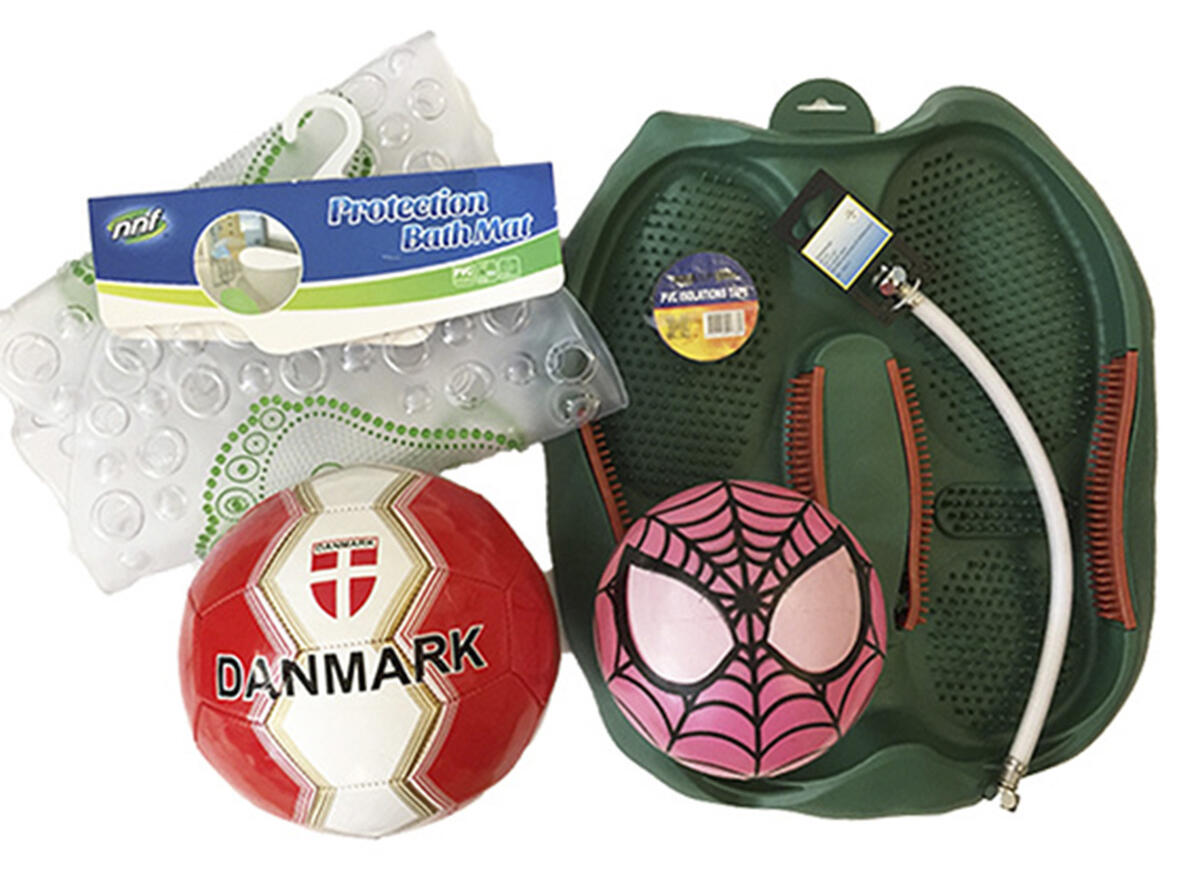Test of phthalates in plastic products
A number of phthalates are banned in the EU as plasticizers in products. However, a new test finds the unwanted chemicals in a bath mat and a ball among other products.

A number of phthalates are endocrine disrupters
Phthalates are chemicals that can be used as plasticizers in plastic, paint and glue.
You can find the chemicals in a number of products. From products like bath mats to hoses as well as shoes and vinyl floors.
In the test, The Danish Consumer Council THINK Chemicals examines 30 different types of products made by soft plastic.
Toy balls and other products of plastic contain banned phthalates
Almost every fourth product tested contained phthalates, which were banned in the EU in new products last year.
For example the restricted phtalates were found in a shoe mat, a bath mat, isolation tape, a toilet hose and a toy ball.
The banned phthalates found in the test were DEHP, DBP and DIBP that are endocrine disrupters. These chemicals are listed on the EU’s official list of unwanted chemicals.
In the test, we also found products containing allowed phthalates such as DIDP and DINP that are suspected of being endocrine disrupters. The chemicals are also suspected of being able to affect the liver and other organs.
A cocktail of chemicals increases health risks
Phthalates evaporates from products and end up in your indoor climate, where you are exposed to the chemicals through dust, among other things. They can also be absorbed through the skin when present in the air.
It is most often not the exposure of a single phthalate that necessarily presents a health risk. It is the combined effect of unwanted chemicals from every day use and exposure. Also called the cocktail effect.
Spiderman ball poses a health risk for children
In some cases, one single product can pose a health risk.
We have reported a Spider man ball from the test to the Danish Environmental Protection Agency. The ball contained a large amount of problematic phthalates.
The Danish Environmental Protection Agency has assessed that the ball poses a serious health risk for small children. If you have bought the ball, we recommend you get rid of it immediately.
Be aware of phthalates despite ban
Since the summer of 2020, the four different types of phthalates DEHP, DBP, DIBP and BBP are banned in consumer products in the EU.
However, products with these phthalates, which were already on the shelves before the ban, may still be sold. Other phthalates are still allowed.
That is why it is a good idea to be aware of products made of soft paste or plastic in Danish stores.
Toys and products for kids have special rules. In these products several phthalates have been restricted for a long time.
About the test
-
How we tested
The Danish Consumer Council THINK Chemicals have bought 30 different types of products in soft plastic from numerous Danish stores.
The products were sent to a lab to be examined for a large amount of phthalates.
These phthalates are tested for in the test:
- DEHP, DIBP, DBP and BBP, which are banned inside the EU since july of 2020.
- DINP, DIDP and DNOP, which are regulated in toys.
- A number of other phthalates, which are listed on the EU’s official list of unwanted chemicals
What we found
We bought 30 products for the test. This is what we found:
- 18 products get an A rating in the test, the were free fron phtalates or only had traces.
- 1 product get a B rating in the test. This is because the product contain DEHP in amounts just under the limit value of 0,1 %.
- 11 products get a C rating in the test. This is because the products contain phthalates. These are the phthalates found: DIDP, DINP, DEHP, DIBP and DBP.
-
- Avoid buying products of soft plastic. Especially products placed in a dusty corner in a shop. Then they are most likely produced before the ban.
- Throw out old toys of soft plastic.
- Buy products with the Nordic Swan ecolabel or the EU flower ecolabel.
- Create a good indoor climate by dusting of and frequent ventilation. Then you can limit the exposure of phthalates in dust and indoor air.
- Use the app Scan4Chem and check your products for unwanted chemicals like phthalates.
-
The Danish Consumer Council THINK Chemicals: Ban is not working yet
“We had hoped not to find banned phthalates in these products. It is both regrettable and concerning that we actually found these unwanted chemicals in a lot of products. This means that the ban is not working yet as it should. Although it is not necessarily illegal to sell these products in stores, we would hope that they are gone as soon as possible”.
Christel Søgaard Kirkeby, project leader at The Danish Consumer Council THINK Chemicals
Center for endocrine disrupters: Phthalates can affect children and teenagers
“The most sensitive time to be affected by phthalates is during the fetal development. But, I would not wish my children getting exposed to these chemicals. Children and teenagers are still individuals under development where their hormonal balance can affect their health now and later in life. Even though we are missing the necessary studies on the area”.
Anna-Maria Andersson, leader of research at the Center of Endocrine Disrupters
The Danish Environmental Protection Agency: No further actions in the transition period
“The new rules mean that the combined effect of phthalates for Danes will decline significantly, which is a good thing. However, as a consumer you will be exposed to these chemicals continuously from products in the home. This is because products made from plastic have a long lifespan. The Danish Environmental Protection Agency will not make further actions during the transition period to make these products go away faster from the market than already planned”.
Magnus Løfstedt, director of chemicals at The Danish Environmental Protection Agency
The Danish Chamber of Commerce: Import companies struggle to navigate
“Our experience show that when a company takes care of deliverers and get sent documentation it is still not at guarantee whether or not the content includes unwanted chemicals. It sounds like we may have to revisit our guidelines to help the companies”.
Jakob Zeuthen, director of environment at The Danish Chamber of Commerce
